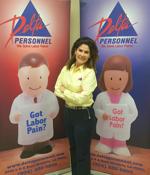Teresa Lawrence, the majority owner of Delta Administrative Services and New Orleans staffing company, Delta Personnel, discovered her mission in life after her mother was badly injured and could no longer work. Lawrence dedicated herself to helping Spanish-speaking people find jobs so they could provide for their families.
In February of 1973, Lawrence and her family fled Cuba for Miami, and they flew to New Orleans with plane tickets from Catholic Charities. Arriving with her brother, mother and grandmother, Lawrence, 13, started her new life in New Orleans.
After cleaning with her mother for years and attending University of New Orleans on a grant, Lawrence worked as a receptionist and an advertising salesperson. She started working at Delta Personnel where she met her husband. She is also a wife, mother, community leader and board member of Catholic Charities Archdiocese of New Orleans.
Teresa Lawrence, majority owner and CEO of Delta Administrative Services, LLC and CEO of Delta Personnel, a New Orleans based staffing company.
PROVIDED PHOTO
How has your journey as a Cuban immigrant impacted your choice of career?
Everything. Immaculate Conception School agreed to give us the opportunity to receive a religious education. We’re Catholic, and we could walk there. The nun saw my mother, and she said that they could use some help in the kitchen. She started in the kitchen, and after that, we started cleaning the school. I did this all the way through college.
When I was on my third semester at UNO, my mother fell down the steps, and she was in traction for nine months, unable to work. Then, no one employed people that did not speak English. So, I made it my mission to go to the Christ the King Church, where many of us did not speak English, to make sure that I employed everybody I could.
How did you get started?
My first contract ran forever — at the New Orleans Convention Center.
I called the man that had the contract many times. His name was Rick Simon, and he worked for United National maintenance. I knew that the Convention Center was the only place that was growing because of tourism. When I got the contract, I told my mom. She started to cry when I told her we would be cleaning the Convention Center because she didn’t want me going back to cleaning.
I told her I was going to be employing people to clean. I was the owner of a contract. I told her that cleaning is what got us to where we are.
I employed anyone I could. I translated everything that my workers needed to know in Spanish. Anywhere I employed Spanish-speaking people, I would go in, and I would literally write a big board of what they needed to know to do in Spanish.
At Schlumberger, they needed the mechanics to know which tools to use. I would tape the English and Spanish version on the walls. The workers would go and point what they needed. That worked.

Teresa Lawrence, majority owner and CEO of Delta Administrative Services, LLC and CEO of Delta Personnel, a New Orleans based staffing company.
PROVIDED PHOTO
What do you see as the value in people of different cultures working together?
When you build trust inside those you know, it’s harder to separate people.
Companies used to say that all the Spanish people were sitting on one side of the room, and the rest of the team were sitting on the other side.
I would tell them to give it a minute. Nothing brings people together more than food. And sure enough, my workers would look forward to American red beans and rice on Monday, and the other teams would look forward to the Spanish frijoles and rice on Fridays.
You can build cultures inside workforces when you have diversity. Even though the workers didn’t understand the language, they could enjoy breaking bread together. Then they would become friends and invite each other to their houses.
Although they didn’t speak English, they started to learn English, and then Americans started to learn a little Spanish. That’s how you build this safety valve. When people come together, nothing is going to explode — because I know you, and you know me, and we know each other.
How have you seen things change for the Spanish-speaking population in Louisiana?
In 1973, the only way you would meet someone that spoke Spanish is if you went to Spanish mass. That’s exactly where the foundation of who knows who, and who can help who, comes from.
We have heritage festivals that come from the congregation of the faith, and the funds that are raised are given back to the church or to a family in need. In our congregations, we have Hondurans, Colombians, Nicaraguans, Peruvians, Cubans. We have all those people now to speak Spanish to.
In what ways are you involved with Catholic Charities, and how do you view your relationship with the organization?
We got to Miami on Feb. 7, and we learned that Catholic Charities had plane tickets for us to New Orleans for Feb. 14.
Years later, Sister Marjorie Hebert, president and CEO of Catholic Charities Archdiocese of New Orleans, asked me to sit on the Catholic charity board. I stared at her for a long time, and I said that I am a recipient of a gift from Catholic Charities. What would I not do for Catholic charity?
It’s full circle.
That’s why Catholic Charities is important to me. The work that they do relates directly to me. I am a recipient. They don’t know who they give it to. They just give, and they don’t ask questions.
Answers have been edited for length and clarification.
Author :
Publish date : 2024-11-23 23:01:00
Copyright for syndicated content belongs to the linked Source.
—-
Author : theamericannews
Publish date : 2024-11-24 18:37:33
Copyright for syndicated content belongs to the linked Source.